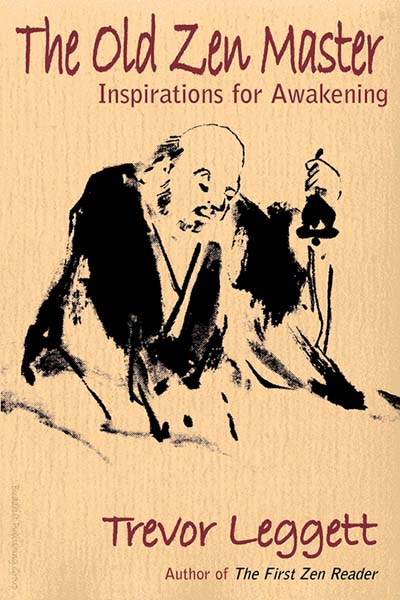The Old Zen Master

Book description
Stories, parables and examples have been a favoured way of conveying spiritual insights and truths since time immemorial. This volume, the last book by Trevor Leggett published in his lifetime, contains stories related not only to Buddhism, but to other religions, as well as to the martial arts, music, chess and incidents in ordinary life. The author says that they contain hints which have helped him and which can be of help to others and that a new angle, or a new illustration- especially if it is an unexpected one- can be a help in absorbing practice, study and devotion.
Paperback published by the Buddhist Publishing Group
ISBN 0946672296
Price £8.00
Book extract
Triumph and Success. One teacher said that people in the world aim at triumph, but spiritual people aim at success. You can spend as much time and energy on securing your triumph beyond your success, as you spent in getting the success. You want to achieve something and it is achieved, but beyond that, you want acclamation, you want triumph, you want the people who opposed you to be humbled and humiliated, you want the Roman triumph where the captors were driven in front and the spoils were displayed-that is triumph! And the teacher said that this spoils the action. The action is no longer pure; it is polluted and corrupted by the desire for triumph. If this is lurking in the heart, then our actions will not be fruitful. They may seem to be effective, but in fact they are contaminated. A very good example of this is in the life of the Emperor Nero. A scholar will say that probably the best ten years for people in the Roman Empire were the first eight or ten years of Nero’s reign. You think, ‘What?’ When Nero was young, his tutor was Seneca, the first of the great Spanish thinkers, a Stoic philosopher. The country was ruled extremely well. Nero was a sensitive, artistic man. He wanted to replace the bloody Roman triumphs by triumphs of art and music. When he had to sign a death sentence, he said, ‘Oh, I wish I’d never learnt to write.’ Under Seneca’s influence, he passed a law which set slaves free from torture. If a slave was tortured by his master, the magistrate had him compulsorily sold to another master. So this was the best time of the Roman Empire. But it was the same Nero-this gentle, artistic, compassionate man-who, after ten or twelve years, was taking part in the tortures himself-because the heart and the mind were not purified. We can be full of good will, compassion and kindness. If we are in the position of an emperor, we can put these things into practice, and we do. But we have no defence against the corruption of the heart from within. There is a Japanese poem: Alas, it is the flower of the heart which fades, without any outward sign. We do not realize these things are happening to us. Without spiritual practice and discipline, gradually, even our best intentions and good deeds change. From success, we turn to seeking triumph and, consequently, the humiliation of others, conquest and glory.
Book Review
…humour and learning… in his own inimitable way…”
“This is a vintage collection of pieces drawn not only from Zen, chess and the martial arts, but also from the Upanishads, the Old and New Testaments, music and various other sources. Sometimes there are useful hints – how to cope with wearing tasks, a sudden flare-up of anger, nagging thoughts. Sometimes a piece has a deeper meaning, which readers are left to work out for themselves. We are introduced to Zen masters, a famous fencing master and a champion chess player, to name but a few of those to be found in these pages.”
(Buddhism Now)